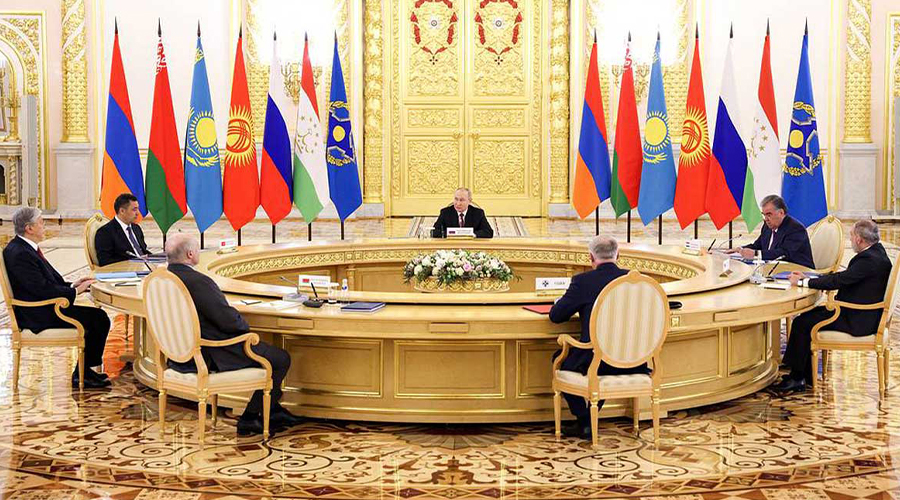On May 16, Moscow hosted the summit of the Collective Security Treaty Organization (CSTO). The summit was held amid complicated circumstances, mainly the Russian-Ukrainian war in which several CSTO members are involved.
The Timing:
The timing of the summit is significant on several levels. The summit, for instance, marks the thirtieth anniversary of the Collective Security Treaty, which was signed in 1992, only a few months after the collapse of the former Soviet Union. In this connection, it is particularly interesting that during the summit, many references were made to the 'post-Soviet space'. The summit also marks the twentieth anniversary of turning the Treaty into an organization whose structures have developed remarkably over two decades. In addition, the summit is the first to be held after the Kazakhstan crisis (January 2022), in which CSTO peacekeeping forces were used for the first time. All the participants in the Kazakhstan operation were awarded in the summit.
Holding the summit while the Russian-Ukrainian war is raging may also be regarded as a geopolitical attempt on Moscow's part to show that it is still capable of exercising influence in Central Asia and countering the West's efforts to isolate it.
It is noteworthy that only a few references were made to Ukraine in the summit's public meeting. While Belarus's President Alexander Lukashenko discussed the crisis in detail, President Putin said he would discuss it in the closed meeting.
The Outcome of the Summit:
The speeches made by CSTO leaders reflected their different priorities. While Putin, the president of a major power, understandably focused on international issues, Belarus's Lukashenko discussed relations with the West, stressing that CSTO should follow the European model by taking unified action to deal with challenges pertaining to the western borders of Russia and Belarus. The presidents of Kyrgyzstan and Tajikistan focused on challenges pertaining to Afghanistan and the southern borders of several CSTO countries. Kazakhstan's president expressed concern over political, military and security threats to CSTO's members. Armenia's prime minister was critical of the stance which CESTO's members, except Russia, have adopted regarding the Armenia-Azerbaijan conflict, most probably meaning the lack of a unified stance on UN resolutions pertaining to the long-standing Nagorno-Karabakh dispute, which, according to the Armenian Prime Minister, requires much detailed discussion.
It is noteworthy here that of all CSTO members, only Belarus voted against UN resolutions condemning Russia's military operation in Ukraine. The other CSTO members generally abstained, voting only against the resolution suspending Russia from the Human Rights Council. Armenia did not take part in that vote, which means that it was absent from the voting session. However, the summit's joint statement expressed satisfaction over coordination between CSTO members concerning regional and international issues.
The joint statement dealt with several issues, mainly bolstering military and political cooperation between CSTO members to deal with the current geopolitical situation, by forming an efficient collective security system. The war in Ukraine was not openly mentioned in the statement which, nevertheless, included references to other relevant issues, such as the USA's unilateral sanctions on Russia and the West's double standards and selectivity in dealing with international laws, Russia's historical role in countering Nazism and xenophobia, NATO's expansion, and biological security. This latter issue was discussed within the broader context of terrorism, transnational organized crime, and information security. The joint statement stressed that cooperating with NATO on such issues is possible (though it is unlikely under the current circumstances. Besides, if NATO ever happened to consider such cooperation, it would cooperate with Russia alone).
Further Development:
The creation of CSTO in 2002 took place against the backdrop of two events of special importance to Central Asia- namely, the USA's war on terror (which required coordination with some central- Asian countries) and Vladimir Putin's rise to power (which established forging new regional alliances to replace the former Soviet Union as a main tenet of Russian foreign policy). Throughout 20 years, the organization has successfully developed a unified stance on several international issues, especially the role of foreign powers in destabilizing the region via the so-called 'color revolutions'. This was reflected in CSTO's stance on the Kazakhstan crisis last January.
In the last summit, several suggestions were made to bolster CSTO' performance and military capabilities. The Belarusian President suggested that a network of think tanks be created all over CSTO countries to provide insights into international issues. Kazakhstan's President suggested that CSTO's peacekeeping forces be increased and involved in UN peacekeeping missions. The Russian President stressed the importance of cooperation with CSTO's 'natural' partners in SCO. However, is it easy to put these proposals into effect, and, in case this happens, will it be enough to ensure more efficiency for CSTO?


